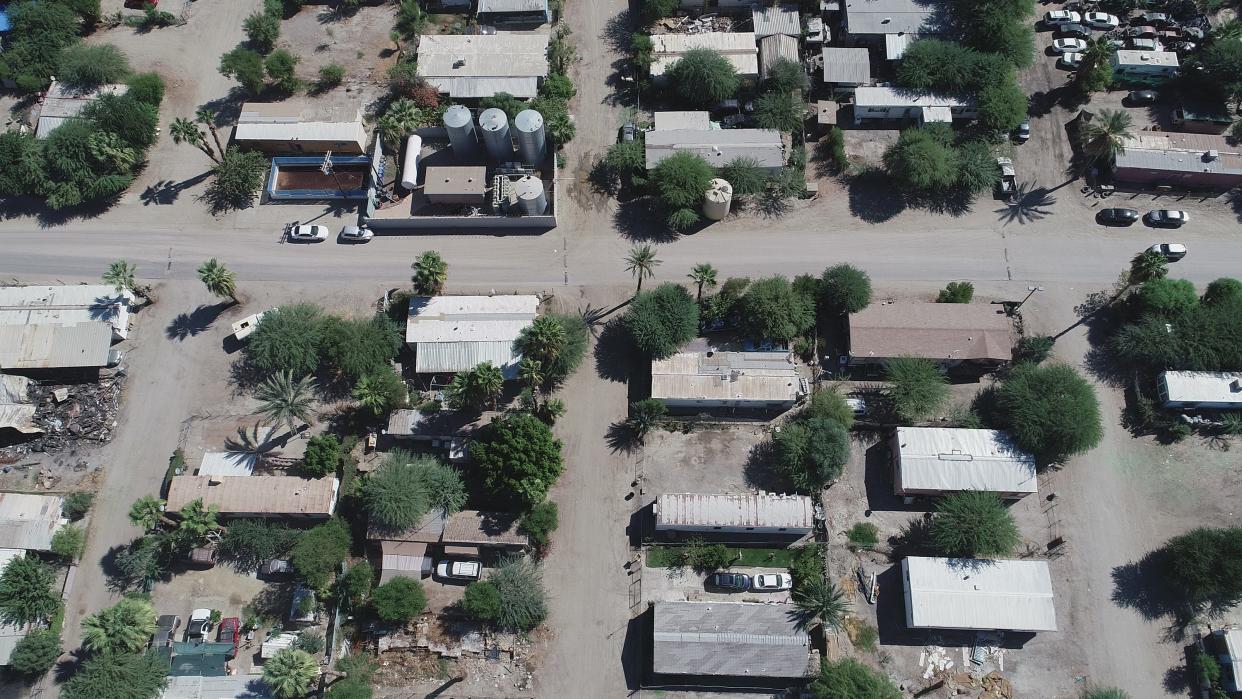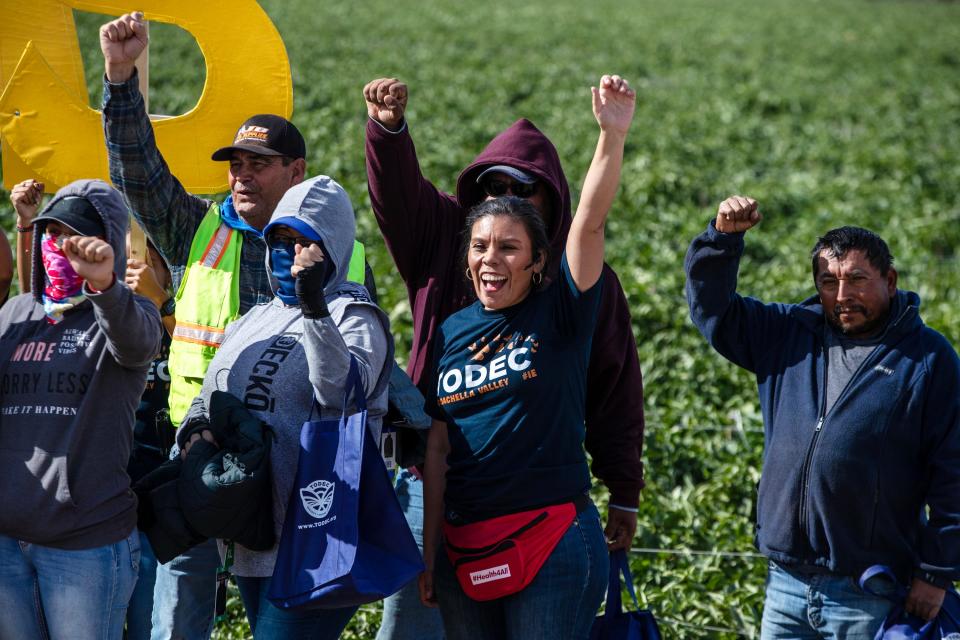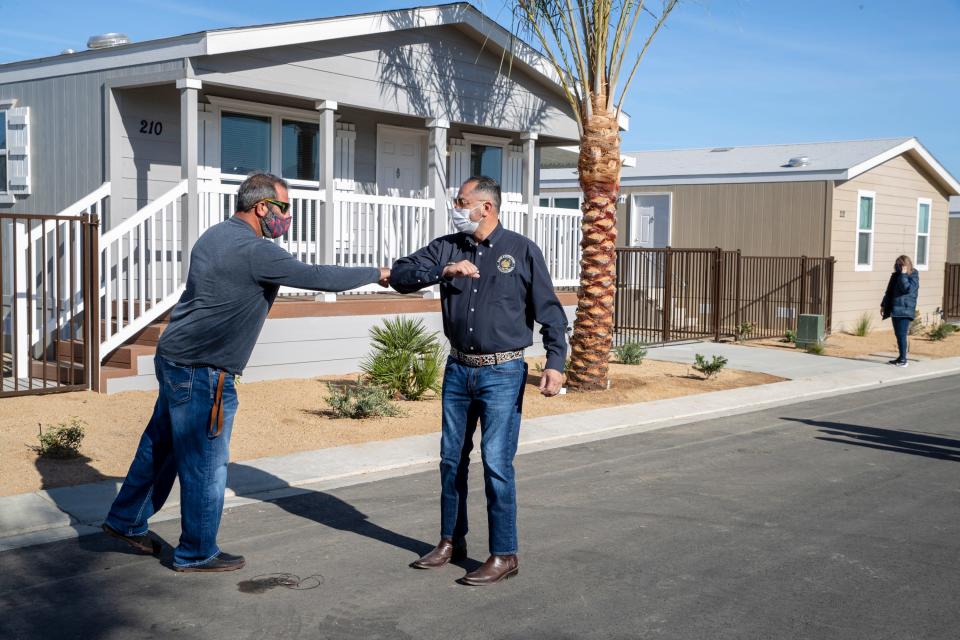State funds safe drinking water at east valley's Oasis Mobile Home Park through 2023

Residents of Oasis Mobile Home Park in Thermal will have access to safe drinking water through 2023 with a new $883,930 state grant. But the water won't come from the taps: The funds will be used to provide bottled water to households.
The State Water Resources Control Board began paying for bottled water at Oasis in October. Before that, the state, Riverside County and local community partners had been covering the cost since July.
The bottled water is not a long-term solution, officials acknowledge, but a stopgap while plans are drawn up for spending more than $50 million in state funding to both relocate Oasis residents and expand public water lines across the eastern Coachella Valley.
County and federal officials, along with the tribe that owns the land where the mobile home park sits, agreed earlier this year that it should be closed. But that can't happen until its 1,000-plus residents have places to go.
Oasis Mobile Home Park has been repeatedly cited by the U.S. Environmental Protection Agency over several years for having water that's contaminated with dangerous levels of arsenic — a known carcinogen that can cause severe health problems if consumed at high levels over a prolonged period.
The water board said in a news release that the grant reflects the state's commitment to address the ongoing water crisis at Oasis.
According to the water board's Deputy Director Joe Karkoski, the funding "complements" another recent commitment of $23 million from the agency to assist the Coachella Valley Water District in a regionalization project meant to improve access to safe and affordable water throughout the eastern Coachella Valley.
The current effort at Oasis is also in partnership with Riverside County and community organizations, including TODEC Legal Center, a nonprofit with offices in the city of Coachella that has volunteered to distribute the bottled water at the mobile home park, two to three times per week through next year.
"This has been pretty much piecemeal. The county has stepped up, and some nonprofits too — The Galilee Center, TODEC — in their efforts, to try to be helpful," Fourth District Supervisor V. Manuel Perez told The Desert Sun.

In August, TODEC asked Oasis Mobile Home Park residents to register to receive a one-time $500 check per household, to help with economic hardship, including the lack of safe water, with a total payout estimated at $119,000.
The organization's executive director, Luz Gallegos, said the checks had all been given out earlier this month and that she was glad TODEC would still be able to assist Oasis households by delivering the bottled water.
In the past, residents at Oasis have relied on a county-supplied water truck that remained at the site for them to retrieve safe water. But some residents noted how hard it was to carry the water back home whenever they needed to do such things as shower or wash clothes or dishes. Some said they'd resort to using water from the faucet as long as they weren't drinking it or using it for food.
Magdalena Arroyo, a resident at the park for 13 years, said having the bottled water distributed every other day has been a big help, more so than other initiatives by the county and water district to provide safe water before, such as the water truck or getting free water at a nearby market.
"Even when we got free water from the store, it wasn't enough for the day-to-day," Arroyo said. "Obviously we continue with the problem now, but it's less costly than us having to constantly buy more bottled water."
Arroyo noted that she still has to shower with water from the faucet, because it's hard to use bottled water for tasks that require so much of it.
More:Feds meet with Oasis Mobile Home Park residents living with contaminated water in Thermal
More:Eastern Coachella Valley to get $2.7 million in federal funds for water infrastructure project
New promise of state help
Though he called the grant "very, very helpful," Perez said the bottled water it will provide "is not the solution."
Instead, he pointed to a recent meeting with Antonio Villaraigosa, the former mayor of Los Angeles who was named infrastructure advisor to the state by Gov. Gavin Newsom this year. In his new role, Villaraigosa will leverage federal dollars for public infrastructure projects across California.
"We had a discussion on infrastructure (while) we toured the east end of the valley, along with the Coachella Valley Water District, and we provided him background as to the regional projects that are going on in order for us to have a sustainable system in place, when it comes to drinking water, to no longer have to use bottled water," Perez said.
He added that it was significant that Villaraigosa witness the water crisis in the area for himself, and said the state official had committed to working with the county to push infrastructure improvements forward in the area.
Perez said: "He left questioning how it is that we live in a first-world country, but yet have (these) terrible conditions, with people having to use bottled water in order for them to bathe, to drink, to cook, to brush their teeth, to clean."
A spokesperson from Villaraigosa's office said he was unavailable for an interview this week.
More:Toxic shower water. Sewage pits. ‘Infuriating’ woes in east Coachella Valley mobile parks
More:New bridges in Desert Hot Springs, east valley water upgrades included in omnibus package
Other state assistance to Oasis Mobile Home Park includes $30 million to help residents relocate. Those funds were requested by Assemblymember Eduardo Garcia, D-Coachella, and approved by Newsom in 2021.
Since the approval, the Riverside County Board of Supervisors has authorized use of the funds on two occasions this year: First, $7 million to advance development of an affordable housing complex in the town of Oasis, and in November, $279,000 to upgrade the Maria y Jose Mobile Home Park, in the same area.
While the new affordable housing complex would not only house Oasis Mobile Home Park residents, the county board had said they would have preference. All 12 spaces at Maria y Jose Mobile Home Park will go to Oasis families.
Despite the millions in state funding, the lack of affordable housing in the area has made it hard to find places where Oasis residents could relocate, Perez said.
He said there are no plans for other withdrawals from the $30 million currently, but that his next goal is to consult with the California Department of Housing and Community Development and get more support to help Oasis families move to affordable housing units or mobile home parks that are in better conditions.

"Another piece of the puzzle is, a lot of the money that we're using right now is for infrastructure," Perez said. "When you talk to developers, especially affordable housing developers, it doesn't pencil out for them to try and build something. Because there's no infrastructure, that's an added cost. So that's where I come in and that's what CVWD is working on."
Earlier in the year, Perez announced that the county, the Torres-Martinez Desert Cahuilla Indians — who owns the mobile home park land — and Bureau of Indian Affairs had collectively agreed that Oasis needs to eventually close down, "due to unresolvable health and safety issues that continue to cause exceptional hardship to residents."
"We understand that there are humanitarian issues involved with these actions. We are currently working on the development of MOUs between the parties to authorize cooperative actions and intergovernmental measures to reduce the tenants in the park," he said then.
Perez said it'd be a long-term effort and estimated it could take five years.
Eliana Perez covers the eastern Coachella Valley, including the cities of Indio and Coachella. Reach her at eliana.perez@desertsun.com or on Twitter @ElianaPress.
This article originally appeared on Palm Springs Desert Sun: Oasis Mobile Home Park residents to get safe drinking water for 2023

